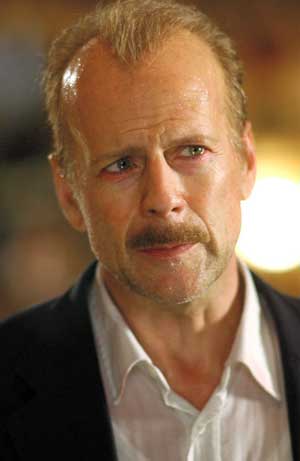 New
New
York City was snowed in on Sunday – two feet of snow blanketed the
town. That didn’t stop an intrepid band of journalists from doing the 16 Blocks junket
in the heart of midtown. Of course some of those journalists had been
flown in from Los Angeles, and were trapped in the city by all the snow.
The
roundtables were in the morning, and we got to speak with director
Richard Donner, screenwriter Richard Wenk and co-star David Morse, and
then after that it was downstairs to a ballroom for a Bruce Willis
press conference. Bruce kept us waiting for almost an hour, but it was
worth it – he was fired up, and he had lots of stuff to say, only some
of it about 16 Blocks. So here for you is the transcript of this almost shockingly honest and often hilarious press conference…
Q:
You’ve portrayed so many different kinds of cops, you must have an
encyclopedic knowledge. You could almost write a book about it. Can you
talk about your insights and why do they fascinate you?
Willis:
Well, I think it’s because partly because I’m from South Jersey and I
have a strong affinity towards working class people. I believe that any
job that requires you to possibly get shot at or get shot dead, you
should be paid hundreds of thousands of dollars for. These guys don’t
get paid anything. Yet they go out there and do it and there’s not a
lot of them out there, and they are the last line between us and the
wolves and the chaos that’s out in the world. There’s a lot of chaos in
the world.
All
these guys — cops, EMT workers, men and women, emergency room doctors
and nurses and people that every night have to see horrific things —
there should be thousands of films done about these guys. And they
should get paid more money. A lot more money, I think.
Q:
This is a one of your great character roles. The mustache, the gimpy
leg, the booze. But the paunch, Bruce. Would Clint Eastwood do this? Is
there too much of a deglamorization going on. Do you consider that a
big risk with this movie, that it’s really not Bruce Willis, the macho
action star, that’s doing 16 Blocks?
Willis: I
don’t — I never consider any of those things. They’re all elements in
the script. It never said that I had to be overweight, but I’ve known
guys who are capable of drinking a bottle and a half of Scotch a night,
and they’re a little overweight. I think they call it booze weight. So
I thought it would help. But everything else — the limp and the
attitude and how beat up he is — were all written by Richard Wenk, the
screenwriter.
But
that said, it could have just been another stupid run-down-the-street
(or limp-down-the street) Bruce Willis film. This film didn’t really
come together until Mos Def showed up with the character. No one knew
what he was going to do, all we knew was that we were fortunate enough
to get him. He showed up with a character that was just genius. That’s
not him. He doesn’t talk like that, he doesn’t act like that, he’s a
very smart creative young man. It changed the fabric of the film, and
it changed the way we all looked at the film. There is sort of a
spontaneous chemistry happening in this film that I’m not sure would
have happened if it were another actor. I was asked yesterday, ‘How do
you feel working with a rapper turned actor?’ I don’t think about him
in that way at all. I think that he is an actor. If he wants to do
poetry, then he can do that. If he wants to rap, then he can do that.
But he is an actor and he’s a very creative guy. And everybody
benefited from his performance in this film. Especially me. Especially
my character.
Q: You are one of the few major Hollywood stars who are proud to be Republican…
Willis:
Let me stop you right there. I’m a Republican — and everybody write
this down because I’m sick of answering this fucking question.
Q: Can I continue –
Willis:
You can continue, but let me answer that part of it. I’m a Republican
only as far as I want a smaller government, I want less government
intrusion, I want them to stop pissing on my money and your money, the
tax dollars that we give 50 per cent of or 40 per cent of every year,
and I want them to be fiscally responsible, and I want these goddamn
lobbyists out of Washington. Do that and I’ll say I’m a Republican. But
other than that, I want the government to take care of people who need
help, like the kids in foster care, the half a million kids who are in
orphanages right now, they call them foster homes but they’re
orphanages. I want them to take care of the elderly and give them free
medicine, give them whatever they need. There’s tons, billions and
billions of dollars that are just being wasted. Okay? I hate
government. I’m apolitical. Write that down. I’m not a Republican.
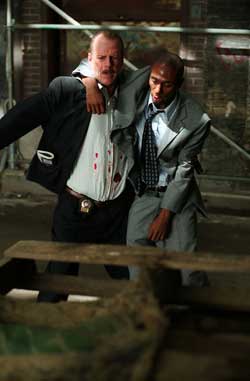 Q: I thank you for this
Q: I thank you for this
Willis: There you go. Now you can finish your question.
Q: Can I change my question?
Willis: Go ahead. I just need to get that Republican shit out of the way.
Q: Do you think it’s legitimate to use violence in order to do the right thing?
Willis: Occasionally. Occasionally, when push comes to shove. I’m not a violent man or advocate violence.
I
will say this: the example that comes to mind is — I think what the
United States and everyone who cares about protecting the freedoms that
the largest part of the free world now has should do whatever it takes
to end terrorism in the world. And not just in the Middle East. I’m
talking also about going to Colombia and doing whatever it takes to end
the cocaine trade. It’s killing this country. It’s killing all the
countries that coke goes into. I believe that somebody’s making money
on it in the United States. If they weren’t making money on it, they
would have stopped it. They could stop it in one day. They could stop
it in one day. It’s just a plant that they grow, and these guys are
growing it likes it’s corn or tobacco or any other thing. By the time
it gets here it becomes a billion-dollar industry. And I think that’s a
form of terrorism as well.
I don’t know what this has to do with 16 Blocks,
but I’m in the mood. Did I answer your question? Violence — look, we
live in a violent world, man. This country was founded on violence.
Who’s kidding who? We came here and said to the Native American
Indians, ‘OK, we got some bad news, we got some pretty bad news, and we
got some really bad news. The bad news is we’re here. The pretty bad
news is we’re not leaving. The really bad news is we’re going to take
all your land, every tiny little bit of land that you guys have and put
you on this little postage stamp of desert where you can’t grow a
thing, unless of course we find oil on that land. Then we’re gonna move
you to another little postage-stamp place in Arizona, and we’re going
to fuck you over and give you blankets filled with smallpox,’ and if
that’s not violence, then what is, my man. What is?
So I’m apolitical! Could I be any clearer? Could I be any clearer?
Q: Bruce, you’d done a number of movies with numbers in the title.
Willis: It’s getting sickening, isn’t it?
Q: What is this affinity for numbers?
Willis:
It’s just a coincidence. It’s just a coincidence. I dunno. It’s easier
for people to remember the names I guess. Although they’re doing good
with Brokeback Mountain. People seem to know that name. I hear that
come up a lot. But I don’t know. It’s a good question, but dig a little
deeper.
Q: Do you think there’s any significance in numbers?
Willis:
You asking me about numerology? I don’t believe any of that shit. I
mean maybe, who knows? Here’s what I believe. I believe there are a lot
of things in the world that happen that are inexplicable but still
happen. And I accept that, and that to me is part of what I call God.
So — but God is also this snow, and God is also the little buds that
come out on the trees, little babies that get born. That’s my God. But
organized religion you can set on fire.
Q:
Donner describes you as being a very brave actor and mentions this is
probably the right time to be playing this character. Do you think this
is the right time? Why do you think that is?
Willis:
Well, that’s a very nice compliment. I don’t think I could’ve played
Jack Mosley 10 years ago. I knew when I was in my 30s that by the time
I got into my 40s and late 40s that I would grow into, that I would
know so much more about life and have lived more life. It just allowed
me to give this character a different worldview than I had when I was
in my 30s. And there are just such better parts now. There’s just so
much cooler things to be able to do. You’ve all seen it, you’ve all
read it, you’ve all seen the little things trying to make you feel less
of a man because you’re losing your hair, but they can all suck my… you
know what I mean? I’m a man and I will kick anybody’s ass who tries to
tell me that I’m not a man because my hair’s thinning. And I like
fooling around with looking different ways. I mean, look, I wear makeup
in films. I don’t wear makeup in real life. It’s just part of the gig,
that’s all. You wear clothes and you gain weight and you lose weight.
Jared Leto, that cat just put on 60 pounds to play Mark David Chapman,
who should never get out of jail by the way.
Q:
Donner also mentioned the look in your eyes in the film, the level of
desperation. What kind of preparation do you have to undertake that
look?
Willis: You
just heard 10 minutes of it. I don’t like the world. I don’t think it’s
being run correctly and I think it could be done a lot better and
because I’m old enough to have grown up at a time – look, I remember
when Jack Kennedy got shot. I remember when the news was just ‘Here’s
what happened and we’re going to show you what it is.’ Now the news is
manipulated and managed and it’s all meant to scare you. They don’t
show you anything good. They don’t show you anything good coming out of
Iraq, all they say this many dead since President Bush took office. But
a lot of great things are happening over there, I went over and saw
things for myself and there’s a lot of jacked up things. So that’s
where that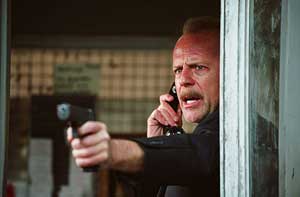
look comes from. I don’t have to look too far to find it, all you got
to do is think about the world my daughters will inherit and I get that
look in my eyes.
Q: Donner mentioned that it was you that called Mos Def to bring him into the film. Were you familiar with his music? Why him?
Willis: We
were friends. I’ve known him for a while and I first saw him in
Monster’s Ball, very different from this. I said ‘Man, you’re awesome,
just a tremendous actor.’ He said ‘I’m doing this play Top Dog
Underdog, in New York, and if you come through there, come see the
show’ which I did, and we started hanging out. When we were going
through the casting process I said ‘I know this guy’ and they said he
already passed. So I said ‘why don’t I make a call?’ I called him up
and he was in Florida getting ready to do an album and I said ‘You
should take a look at this, it’s a terrific, really good part.’
And
I think this is a career-making role for him. I think people are going
to see him in a much different way. I love him. He’s just like a little
angel and in real life too, but in this movie he really has an angelic
quality, which just comes out of him. He’s not acting that, it’s just
Mos.
Q: Why make a movie about police corruption?
Willis:
The thing that I like about this film that comes out of – and I’m not
sure it would have happened had Mos not done the film – but the story
in the film is kind of a microcosmic view of what’s going on in the
world, the chaos in the world. I personally feel that the world is out
of control and we can’t affect the politicians, we can’t get the
lobbyists out of Washington, we have no connection with our senators
and congressmen who don’t give shit about us, they’re just up there. It
just seems that their job is to do nothing, is to give the appearance
of them doing something but they’re not doing anything. And money
corrupts. It’s all about money and everybody needs money. If cops were
paid $150,000 a year, instead of 40 thousand dollars a year to get shot
at every night, and have 5 kids that you’ve got to put through school
on 40 thousand a year, no way, it’s not going to happen. And as a man,
in this modern world, we’re still the hunter gatherers, we’re just the
modern version. We have to protect our family and we protect the cave,
you want a house where your kids are safe and you’re going to do
whatever that takes. And sometimes it takes breaking the law and
becoming corrupt. Money does corrupt.
Q:
You attended the aftermath of a shootout driving around with a
detective while preparing for this role. What do you get out of that
process? It must have been disturbing?
Willis:
It was definitely disturbing; nobody likes to see that. But it goes on
every night and maybe one or two things are reported. But we kind of go
for the sensational now in the news – if it’s not sensational or
tantalizing or making fun of someone, it doesn’t make the news. I don’t
watch the news. I’ve turned it off and I feel so much better for it,
which is why I have that youthful glow about me. But I wanted to get
out there, I wanted to get out there on that shift that those guys
work. I haven’t done it for a while. And I was with a really good guy.
They’re dealing with things that none of you guys, nobody in this room
or city wants to deal with and they’ve been dealing with it for less
than 50 grand a year. After taxes how much is that? 35 maybe? You can’t
feed your family on that.
Schoolteachers
too, while we’re talking about being political. 100 grand, let’s throw
money at them. In ten years we’d have a much smarter group of kids
coming out of the schools because you’d get great teachers. Great
teachers can’t work as teachers now because they can’t afford to raise
kids on 35grand a year. So let’s throw some money at the problem. Let’s
not build one more rocket, let’s take one rocket less, one bomb less,
and you can solve a lot of problems.
Q: Did you see yourself early on changing up between different kinds of characters and films and being flexible?
Willis:
I’ve done different kinds of films but not all of them get seen. In the
last two years I’ve done a different bunch of films that all seem to be
coming out in 5 months of each other and they’re very different. Well,
you guys will see them. You see everything. You’re probably sick of it
already and it’s only February.
Lucky Number Slevin is a really great movie. Wait till you see Alpha Dog; crazy, really represents what’s happening in the Valley in California, these kids are getting high all day long.
Q: Sin City 2?
Willis: Not yet. Clive Owen is in it, but we’re talking about a prequel. 16 Blocks coming out and I did Over the Hedge, an animated movie that is really funny. It has jokes for kids in there, but also a lot of jokes for adults.
But
I don’t have a plan to say I want to do THIS film because I want to
make THIS statement. I think my job is to be entertaining. If you’re
going to come out of your house, get in your car, park your car, buy
tickets, buy food and popcorn and all that stuff and sit in a movie
theatre, instead of sitting in front of that big flat screen where you
can just wait and get the DVD, it’s our job to be entertaining. I never
gave any thought to I wanted messages for this film. I think messages
are for documentaries, if you want to try to teach somebody something.
And I don’t know if people learn from documentaries anyway.
Q: This movie does have a kind of message that people can change. What were the things that changed you?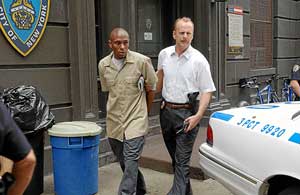 Willis:
Willis:
Having 3 kids changed me. I think the kind of change we show in this
film is the most difficult kind. If your doctor says, ‘Hey, you’ll die
if you smoke another packet of cigarettes,’ you’ll give up but most of
the time it comes down to those kinds of life threatening situations to
get people to change. The kind of change you see in this film, comes
because my character wakes up; and he doesn’t do it by it himself. It’s
one of the things I love most about this film, is that my character
couldn’t have changed had it not been for Mos Def’s character and Mos
Def’s character couldn’t have changed without my character. So what
does that say? Do we need each other? We need each other’s help to
change sometimes. Change is a difficult thing
Q: How have your kids changed you?
Willis:
Here’s how it helped me change. Before I had kids, I was just thinking
about myself. I was just all me, my world. When I had my first
daughter, Rumer, who’s now a young woman, it was like ‘Oh my God.’ It’s
unbelievable the change that came over me. Everything else seems stupid
once you have kids. Everything else you worry about, ‘Oh, how am I
going to get this? How am I going to get that? I want this, I want
that.’ Then you have this little baby, this little tiny infant that
needs your help, you just go, ‘Oh, who cares about everything else.’
I
really lean into being a dad. I like being a dad. I know there are a
lot of men out there who don’t take care of the babies that they bring
into the world and that is a horrible situation. I can’t imagine that.
I don’t get it. I don’t understand why that happens. But it does
Q: Entertainment Weekly says…
Willis: Did you just say Entertainment Weekly? Do you work for them?
Q:
No but they said one of the films they never want to see is Die Hard 4.
Does that surprise you since all the want to see it? And would you
still do it?
Willis: Entertainment Weekly hates me. They’ve hated me since they’ve been a magazine. Fuck ‘em. And you can go and tell them that.
Q: Why?
Willis: Because I’m a threat to them. Why does anybody hate anybody? Because they have some beef. Who cares? They can all blow me.
Q: What’s your take on Die Hard 4? Do you want to do it? Is it going to happen?
Willis: Yes, I would like to see Die Hard 4 happen. If it happens, if they get the script right, yeah, I’d consider it.
All
those magazines, here’s a good example. Look at what happened to James
Frey in the last two weeks. That’s a great book, a great book and so is
the follow up book. And just because his publisher chose to say these
are memoirs, it took it out of being a work of fiction – a great work
of fiction, very well written – to this guy being sucker punched on
Oprah by one of the most powerful women in television just to grind her
own axe about it. Hey Oprah, you had President Clinton on your show,
and if this prick didn’t lie about a couple things, I’m going to set
myself on fire right now.
James
Frey is a writer. He can write whatever he wants. It’s fiction. It’s
just shameful how he was treated. It’s just shameful and it’s just not
fair and not right. Justin Timberlake had a really good response when
he was asked about that because I think he was asked to play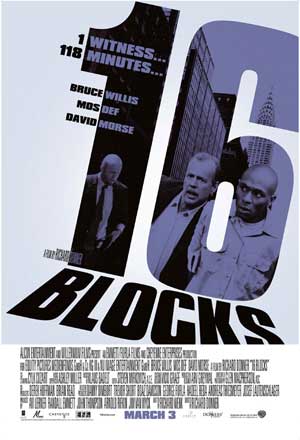
James Frey in the making of that book. And he waited and waited and
listened to everybody and said, ‘Have you heard of this magazine called
In Touch Magazine? Or Us Weekly? Or People Magazine? Or any of these
magazines. They lie about people and they just make up shit all week
long.’ And you have to sue ‘em to get it changed. This is the world we
live in. That is approved and that is okay and people go, ‘Ooh, ooh.
Somebody’s boning this person over here or something, somebody did this
over there,’ and they’re all lies and nobody’s yelling at them. So
let’s leave James Frey alone, how about it?
I’m pissed off today.
Q: Don’t you think oprah had to respond because people were coming down on her?
Willis:
Hey, I know a lot of women respect Oprah and I do too, but I just think
she did it because she got her feelings hurt. She took it a little- –
went a little deep. And you know what? He didn’t know what she was
going to say to him. She said, ‘Come on in, it’ll be alright.’ And then
she goes BANG. And I’m a fan of Oprah’s. She’s doing great. She does
great things. That whole book club thing is a really great idea, but I
think James Frey got treated a little unfairly.
Q: Would you write your memoirs?
Willis: No. Too many people would get hurt, because I would have to tell the truth. But it would be a great book!
Q: Let me first say I don’t scubscribe to EW.
Willis: They
can hate me. I don’t care. Whatever. They can do whatever they want.
I’m still here after 22 years. Still talking to you guys.
Q:
You jump between big budgets and indies. Is there a greater chasm now
between the films critics like and reward and those who audiences go
see?
Willis:
Hollywood’s changed a great deal since 9/11. It’s a much more cautious
time in Hollywood now and it’ll come back. It’ll change. When five
movies come out and make- – five different films of different genres
come out and make $150 million each or $200 million each, it’ll go
back. They’ll start spending money again. But it really is a cautious
period of austerity in Hollywood.
The
Oscars, I don’t know. I don’t have any comment about the Oscars because
the Oscars are people’s opinions and I don’t think it reflects public
opinion all the time. Sometimes it does. I will say that Jamie Foxx was
unbelievable as Ray Charles. I mean, I thought it was Ray Charles. I
was watching him, I said, ‘That’s not Jamie. That’s Ray Charles.’ And
it was a brilliant movie and brilliantly done. So there’s an example
where the world said, ‘Yeah, we agree.’
Q:
But are the nominated films this year the Academy’s way of telling
Hollywood to concentrate on story and character? Don’t worry so much
about big budgets and special effects and such?
Willis:
Maybe. I don’t know. I don’t know the answer to that so it’s just as
good a theory as any. I don’t think the Academy has much influence over
what films Hollywood chooses to make. Nobody knew that the films that
got nominated were going to make the kind of noise that they did, so
it’s all a crapshoot. It’s all a crapshoot. In this film, if we hadn’t
gotten Mos Def, if we hadn’t had a great script, if we hadn’t had
Richard Donner, this could’ve been another film that came and went and
became a little round disc, a little piece of software and that’s
really where it’s going. It’s almost like the movie is the commercial
for the DVD sale because that’s what they want. Because let me tell you
something, jack, that little round disc is going to be around forever.
People have collections of those now and when one of them wears out,
they’ll go out and get it again. I watch films all the time. I still
watch them and I watch films over and over and over. I watch Goodfellas once a week on DVD. I watch Strangelove four or five times a year. I watch old movies and new movies and that’s how people are seeing it now. I can’t go out and see Dr. Strangelove in
any movie theater. In New York, they used to have great revival houses.
They don’t have that now so you’ve got to do it. You’ve got to watch
them on DVDs.